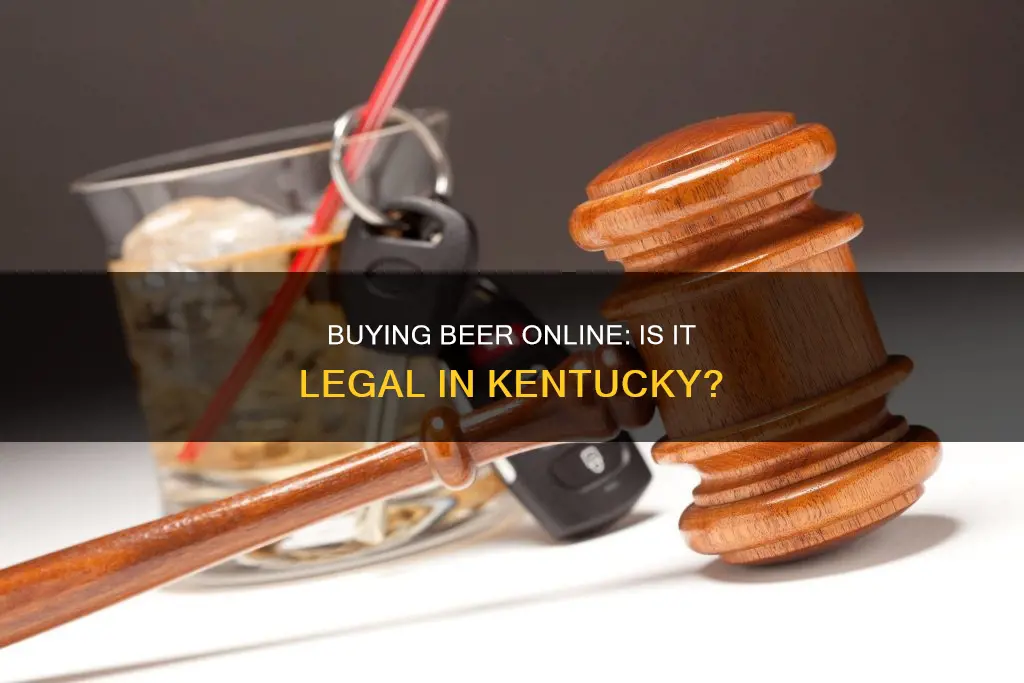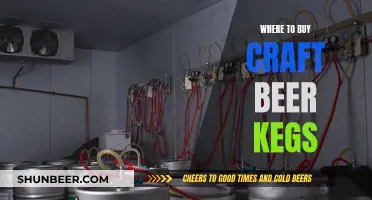
Kentucky's alcohol laws are a confusing patchwork of regulations that vary from county to county and even city to city. The state's 120 counties are classified as wet, dry, moist, or dry with special provisions. This means that the answer to the question Can you buy beer online in Kentucky? is It depends on where you are. While grocery stores can sell beer in the main shopping area, they can only sell wine and spirits if they provide a separate entrance to that part of the store and ensure that minors do not work there. Online alcohol delivery services are available in Kentucky, but they will only deliver to customers who are 21 or older and can provide a valid photo ID.
| Characteristics | Values |
|---|---|
| Online Alcohol Delivery Services | Instacart |
| Alcohol Delivery Cost | Delivery fees start at $3.99 for same-day orders over $35. |
| Alcohol Delivery Time | Alcohol delivery windows in Kentucky start as early as 9 am and run as late as midnight. |
| Age Limit | 21 or older |
| Valid IDs | United States-issued driver's license with photo, United States-issued military ID, State-issued identification card, United States-issued passport |
| Types of Alcohol Sold | Beer, wine, liquor, and extras like soda and mixers |
| Alcohol Consumption Status of Counties | Dry, Wet, Moist, or dry with special provisions |
What You'll Learn

Kentucky's alcohol laws are a maze of obscure statutory language
Kentucky's alcohol laws are notoriously complex and confusing, with a history that dates back to the end of Prohibition in 1933. The state's 120 counties are classified as either "wet", "dry", "moist", or dry with special provisions, leading to a patchwork of different rules and regulations across the state. This system, known as local option elections, allows counties, cities, or even individual precincts to vote on whether to allow the sale of alcoholic beverages.
The complexity of Kentucky's alcohol laws was highlighted by a justice of the Kentucky Supreme Court, who wrote in 1985 that the laws were a "maze of obscure statutory language" and "confusing at best". This assessment was echoed by the general counsel of the Kentucky Office of Alcoholic Beverage Control (ABC) in 2012, who noted that the laws had not been simplified and remained a confusing patchwork.
One of the most significant quirks of Kentucky's alcohol laws is the distinction between different types of alcohol. For example, wine can be purchased in a pharmacy but not in a supermarket, while beer can be sold in the main shopping area of a grocery store, but wine and spirits can only be sold if they are in a separate section with a different entrance. This distinction dates back to Prohibition, when prescriptions for alcohol could be obtained at pharmacies. After Prohibition ended, sales of alcohol in grocery stores were restricted due to concerns about minors having access.
Another inconsistency in Kentucky's alcohol laws is the difference in legal ages for buying and selling alcoholic beverages. The legal age for purchasing alcohol is 21, as in all U.S. states. However, the legal age for selling or serving alcoholic beverages in a licensed establishment is 20.
The ABC has very specific terminology and classifications for the state's counties based on their wet/dry status. In addition to the basic wet, dry, and moist categories, there are several subcategories that allow for more nuanced control over alcohol sales. These include "limited", "golf course", "winery", and "qualified historic site" designations, each with its own specific requirements and restrictions.
The wet/dry status of counties in Kentucky is not static and can change over time through local option elections. As of 2013, 38 counties were dry, 32 were wet, and the remaining 50 were either "moist" or dry with special circumstances. However, this balance can shift as communities hold local option elections to expand or restrict alcohol sales.
The intricacies and inconsistencies of Kentucky's alcohol laws have led to calls for reform and modernisation. In 2012, Governor Steve Beshear appointed a task force to streamline the state's alcohol laws and make them more suitable for a 21st-century economy. While there have been efforts to simplify the laws and make them more accessible, Kentucky's alcohol regulations remain a maze of obscure statutory language that can be challenging to navigate.
Olympia Beer: Where to Buy and Enjoy It
You may want to see also

Beer can be bought online via Instacart
Kentucky's alcohol laws are notoriously complex, with a patchwork of counties and cities that are either dry (prohibiting all alcohol sales), wet (permitting full retail sales), or "moist" (a middle ground between the two). This can make buying beer and other alcoholic beverages challenging for residents and visitors alike. However, one convenient option to navigate this maze of regulations is to use Instacart, an online service that allows you to order beer, wine, or liquor for delivery or pickup in Kentucky.
Here's how it works: using the Instacart app or website, you can browse and select your favourite alcoholic and non-alcoholic beverages from a store near you in Kentucky. You can also add extras like mixers and soda to your order. Once you've placed your order and chosen a delivery time, Instacart will connect you with a personal shopper in your area. This shopper will go to the store, purchase the items on your behalf, and deliver them to your doorstep.
To ensure responsible alcohol delivery, Instacart has implemented several measures. Firstly, customers must be 21 or older to order alcohol and are required to provide a valid photo ID during delivery. The Instacart shopper will typically scan the back of the ID card to verify the customer's age. Additionally, contactless delivery is available, and shoppers are trained to not deliver alcohol items to those who are visibly intoxicated.
Instacart also provides transparency throughout the delivery process. You can track your order's progress and communicate with your shopper using the app or website. While additional alcohol cannot be added to your cart after placing the order, you can make changes to your existing order before it is finalised. Delivery fees start at $3.99 for same-day orders over $35, and you can schedule your delivery for as early as 9 am or as late as midnight, depending on the store's operating hours.
So, if you're looking to buy beer online in Kentucky, Instacart offers a convenient, reliable, and flexible option that helps you navigate the state's complex alcohol regulations.
Little Somethin' Somethin' Beer: Arizona's Unique Brew
You may want to see also

Kentucky's 120 counties are classified as wet, dry, moist, or dry with special provisions
The classification of Kentucky's 120 counties as "wet", "dry", "moist", or dry with special provisions is based on the regulations governing the sale and consumption of alcoholic beverages in the state. Here is a breakdown of these classifications:
- Wet counties: These counties permit the full retail sale of alcoholic beverages under state licenses. In wet counties, sales of alcoholic beverages for on-site or off-site consumption are allowed in at least some areas outside of an incorporated city. However, it is important to note that many wet counties also have dry precincts. For example, Louisville and Lexington, the two consolidated city-county governments in Kentucky, are both considered wet but have dry precincts within them.
- Dry counties: In dry counties, all sales of alcoholic beverages are prohibited. These counties do not allow the sale of alcohol in any form.
- Moist counties: Moist counties occupy a middle ground between wet and dry counties. A moist county is typically a dry county that contains one or more wet cities, allowing alcohol sales in certain situations but with limitations that a normal wet county would not have. For instance, a moist county may permit alcohol sales in specific cities for off-premises consumption or in qualifying restaurants.
- Dry with special provisions: Some dry counties have approved the sale of alcohol under certain special circumstances. These provisions can include sales at golf courses, wineries, or qualified historic sites within the county. These counties are still considered dry but have specific exceptions that allow for limited alcohol sales.
The classification of Kentucky's counties as wet, dry, moist, or dry with special provisions can be confusing due to the complex and sometimes conflicting alcohol laws in the state. These laws have evolved over time, with local option elections allowing communities to decide whether to expand or restrict alcohol sales. As a result, the map of alcohol sales status in Kentucky frequently changes, and the regulations vary from county to county.
Amazon Beer Buying Guide: What's Available?
You may want to see also

Wine can be bought in a pharmacy, but not a supermarket
Kentucky's alcohol laws are notoriously confusing, with a "maze of obscure statutory language" according to a Kentucky Supreme Court Justice in 1985. The state's 120 counties are classified as either "dry" (prohibiting all sale of alcoholic beverages), "wet" (permitting full retail sales under state license), or "moist" (a mix of the two). The laws, some of which date back to 1935 after the end of Prohibition, allow counties, cities, and even individual precincts to vote on whether to permit alcohol sales.
Adding to the complexity, there are over 70 types of licenses for alcohol sales, including four types of restaurant licenses. One notable quirk is that wine can be purchased in a pharmacy, but not in a supermarket. This law also dates back to Prohibition, when prescriptions for alcohol could be obtained at pharmacies. After Prohibition ended, sales in grocery stores were prohibited because it was believed that minors were more likely to be in those stores than in pharmacies.
Today, grocery stores can hold wine and spirits licenses, but they must provide a separate entrance to that part of the store and minors are not allowed to work there. Beer, however, can be sold in the main shopping area of grocery stores, but only by a store employee of legal age.
The laws vary from town to town, and even within towns. For example, in Louisville, packaged alcohol can be sold from 1 pm until midnight on Sundays, but in Indiana, only stand-alone liquor stores can sell refrigerated beer, and grocery stores and gas stations can only sell warm beer.
The state's alcohol laws have been described as "perplexing" and "piecemeal", and there have been calls for statutory reform to modernise and streamline them.
Arizona's Sunday Beer Buying Laws: What's Allowed?
You may want to see also

The minimum age to buy alcohol in Kentucky is 21
Kentucky has a complex set of laws surrounding the sale of alcohol, with counties, cities, and precincts having differing rules. There are dry counties, which prohibit all sales of alcoholic beverages, wet counties, which permit full retail sales of alcohol under a state license, and moist counties, which have a mix of dry and wet cities. As of 2012, there were 39 dry counties, 32 wet counties, and 49 moist or dry counties with special circumstances.
The laws regarding alcohol sales in Kentucky are constantly changing due to local option elections. For example, a dry city can vote to become wet, but if a wet city votes to become dry, it cannot hold another election to return to wet status. Kentucky also has over 70 types of licenses for the sale of alcohol, including four types of restaurant licenses.
In terms of purchasing alcohol, there are some unique restrictions in Kentucky. For instance, a consumer can buy wine in a drug store but not in a supermarket. A grocery store must have a separate entrance and shop to sell wine or liquor. Additionally, a consumer can run a tab at a bar for beer but not for distilled spirits or wine.
The minimum age to buy alcohol in Kentucky is an important aspect of its complex alcohol laws. While the drinking age is uniform across the state and the country, the laws surrounding alcohol sales and consumption continue to evolve and vary depending on the specific location within Kentucky.
Buying Beer at Pennsylvania Gas Stations: What's the Deal?
You may want to see also
Frequently asked questions
Yes, you can buy beer online in Kentucky through apps such as Instacart.
You must be 21 or older to buy beer in Kentucky.
No, alcohol delivery windows in Kentucky start as early as 9 a.m. and run as late as midnight.







